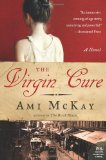Summary | Excerpt | Reading Guide | Reviews | Beyond the Book | Read-Alikes | Genres & Themes | Author Bio

A Novel
by Ami McKayThis article relates to The Virgin Cure
As Ami McKay notes in the afterword of The Virgin Cure: "In 1870, there were over thirty thousand children living on the streets of New York and many more who wandered in and out of cellars and tenements as their families struggled to scrape together enough income to put food on the table."
 The New York Infirmary for Indigent Women & Children was opened on May 12, 1857 by Dr. Elizabeth Blackwell, who was born in 1821 in Bristol, England and is credited with being the first female to receive a medical degree in the United States. (This hospital still exists, but today it is known as the New York Downtown Hospital.) The mission of both Elizabeth and her sister, Emily Blackwell - who earned her medical doctorate five years after her sister in 1854 - was to bring proper medical services to the thousands of women and children living in poverty on Manhattan's Lower East Side.
The New York Infirmary for Indigent Women & Children was opened on May 12, 1857 by Dr. Elizabeth Blackwell, who was born in 1821 in Bristol, England and is credited with being the first female to receive a medical degree in the United States. (This hospital still exists, but today it is known as the New York Downtown Hospital.) The mission of both Elizabeth and her sister, Emily Blackwell - who earned her medical doctorate five years after her sister in 1854 - was to bring proper medical services to the thousands of women and children living in poverty on Manhattan's Lower East Side.
Many of the residents in this area of New York City were recent immigrants. Their living conditions, if they had homes, were deplorable and disease was rampant. Very early on, Blackwell focused on the importance of hygiene in daily living. Blackwell would also, as Dr. Sadie does in The Virgin Cure, make house-calls in order to visit and treat her patients. Women providing medical services at this time were often viewed purely as providers of abortions. It was the hope of the Blackwell sisters to change this perception and prove women were as capable as men in the field of medicine.
As in The Virgin Care, at the time of the hospital's founding, female doctors were not only rare but judged harshly by society for not conforming to expectations. In the novel, Dr. Sadie forgoes a life of marriage and family for many years because of her choice to practice medicine. Her family doesn't agree with her decision to forge a career and, consequently, she distances herself from them. Many women who wanted to attend medical school and work as doctors faced extreme opposition; not least Elizabeth Blackwell who, according to journalist Leo Trachtenberg, was only offered admission to Geneva Medical School because the students - who were charged with voting on her admission - thought her application to be a joke.
He writes:
For a while, it seemed as if America would reject Blackwell: she applied to more than 20 U.S. medical schools during early 1847; none granted her admission. It was an anxious, disheartening time. In October 1847, though, a letter arrived from tiny Geneva Medical College in upstate New York that proved decisive for Blackwell and for American medicine. It simply stated that the college faculty had voted to admit her if the student body unanimously approved. A short time later, the students - playing along with what they thought a professorial joke - voted to let her in. Much to their surprise, a 26-year-old Blackwell, wearing a simple gray frock and bonnet, showed up in Geneva on November 6, 1847, to begin her medical education.
Though now officially enrolled, Blackwell still faced deep and widespread disapproval. "I afterwards found that I had so shocked Geneva propriety," she wrote, "that the theory was fully established either that I was a bad woman... or that being insane, an outbreak of insanity would soon be apparent." But the faculty, at least, soon became grateful for Blackwell's demure presence: when she attended a lecture the normally rowdy male students suddenly grew reserved and studious.
She proved a very bright and competent student, graduating at the top of her class on January 23, 1849.
The dedication at the beginning of The Virgin Cure is to Sarah Fonda Mackintosh, Ami McKay's great-great-grandmother and the real Dr. Sadie. To read more about McKay's personal inspiration for The Virgin Cure, visit her website. And to learn more about Dr. Elizabeth Blackwell, click on the video below.
Filed under People, Eras & Events
![]() This "beyond the book article" relates to The Virgin Cure. It originally ran in June 2012 and has been updated for the
July 2013 paperback edition.
Go to magazine.
This "beyond the book article" relates to The Virgin Cure. It originally ran in June 2012 and has been updated for the
July 2013 paperback edition.
Go to magazine.
Your guide toexceptional books
BookBrowse seeks out and recommends the best in contemporary fiction and nonfiction—books that not only engage and entertain but also deepen our understanding of ourselves and the world around us.